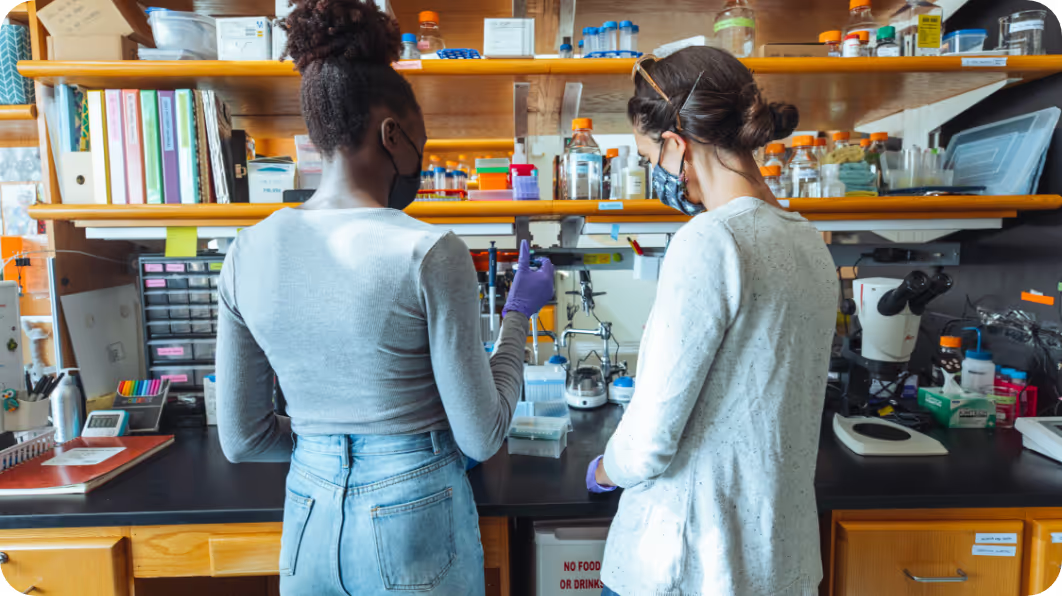Join
Our lab values kindness, collaboration, and community. We are committed to fostering the collective success of our lab members by supporting their professional and personal growth.
In our lab, you can expect to receive individualized mentorship in an inclusive and safe environment.
This includes coaching, scientific feedback, and training tailored to prepare you for the next phase of your career.

How to Join
Undergraduate Students
To apply for a position in the lab, please fill out this form. Then, email the person in the lab whose project you are most interested in working with to see if they have the capacity to mentor students.
Stanford students are welcome to apply to the lab. We aim to support a wide range of perspectives and life experiences in our laboratory. Students are either paid for their work in the lab or can receive course credit. We also host undergraduate summer internships through the Department of Biology B-SURP program, the Bio-X interdisciplinary program, and the Wu Tsai NeURO fellowship program. These programs give Stanford undergraduates the opportunity to intern in the lab for 10 weeks, work on an independent project, and have multiple social and educational opportunities. Applications to this program are due in December (Bio-X), January (Biology), and February (NeURO).
Non-Stanford students who are interested in summer research can apply through the SSRP-AMGEN program.
Community college students are welcome in our laboratory. Prof. O’Connell is a community college alumna and is passionate about uplifting community college students in STEM. We have funding from the National Science Foundation to support community college students in the lab.
Graduate Students
Our lab accepts students through the Department of Biology’s Cellular, Molecular, and Organismal Biology (CMOB) graduate program. We recommend applying for the Stanford Biology Preview Program for guidance on how to navigate the Biology PhD application process. Students are advised to write their application personal statement with a broadly important scientific topic that links to several CMOB faculty in the Biology department. The admissions committee is populated by faculty and graduate students from across the department who score the following components:
- Departmental fit: Interested in several Dept of Biology faculty
- Scientific achievement: Personal statement and CV convey substantial independent research with deliverables such as publications, honor thesis, and awards. Successful applicants convey that they understand the “big picture” and their data answer a clear question rather than being purely technical.
- Other indicators of success: Personal statement and letters of recommendation convey evidence of grit, resilience, and a love of science. This can include overcoming personal or professional challenges and efforts to enrich their community.
- Academic achievement: Letters of recommendation and CV convey a positive trajectory in grades, and letters describe applicants as being outliers compared to others.
Who do you talk to about applying, and what is the lab environment like? To make the application process equitable, Prof O’Connell does not video conference with select applicants. This is because there are too many requests to accommodate everyone, and it takes some level of social capital to know how to email prospective advisors. However, lab environment and fit are incredibly important to success in graduate school, and so Prof O'Connell hosts “Grad School Q&A sessions” in the Fall application season where prospective graduate students can ask questions about research, mentorship, and laboratory environment.
Postdoctoral Researchers
There are two general paths to obtaining a postdoc position in our lab.
Open searches: Open-funded positions in the lab are advertised in a broad search. Broad, advertised searches result in a more diverse candidate pool and, therefore, are the preferred method of attracting postdocs to our lab. Application materials include a Statement of Interest and a Community Engagement Statement of no more than one page each.
When we have an open search, applicants are reviewed by an internal committee made up of current lab members and Prof O’Connell. Applicants are ranked and the committee selects individuals to interview. For the interview process, candidates present both their past research and future research ideas in a lab meeting. Candidates also meet other lab members in small groups. After all candidates are interviewed, the entire lab discusses the candidate pool at a lab meeting and an anonymous vote decides who we hire. Every person in the lab who met with candidates gets a single vote, including undergraduates, technicians, graduate students, postdocs, and Prof O’Connell.
Targeted fellowships: The other mechanism to obtain a postdoc position in the lab without an open search is to be awarded a fellowship supporting your position in the lab. This can include federal or private foundation fellowships. If you are interested in applying for fellowships, please contact Prof O’Connell with a Statement of Interest (no more than one page), a Community Engagement Statement (no more than one page), and your CV.
Research Associates and Technicians
We currently do not have any open lab technician positions.
Job ads will be advertised here and on the Stanford Careers site. Technician positions generally require a CV and a Cover Letter that states why you are interested in the position.




